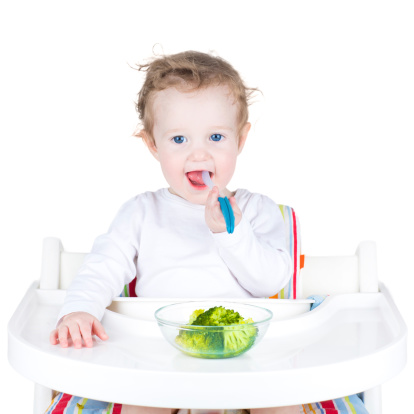
Note: This is an often touchy subject for parents. There are many cultural influences that change the way feeding and self-feeding are approached by parents. That aside, the following article discusses the importance of allowing children to be in charge of their own feeding and learn how to listen to their bodies.
WHY IT IS IMPORTANT TO LISTEN TO YOUR CHILD’S NEEDS
Babies are born with the basic instincts of rooting and sucking; that is finding a food source and eating. They stop when they are full and cry when they are hungry, simple right? As they grow older and move into solid foods, there is more of a challenge to know when and how much to feed your child. As a parent, it is important to help your child stay in touch with their basic instincts and listen to their own body’s cues for hunger and satiation. Parents may encourage children to eat more than they can or need to, causing them to lose touch with their bodies’ basic instincts and instead learn to look for external cues on when to stop eating. When we tell our child to finish their plate, or that they haven’t eaten enough, they begin looking for cues such as an empty plate to know they are done. This may lead to overeating, upset stomachs, and issues with eating later in life.
CREATING YOUR CHILD’S PLATE
During mealtimes it is important to not to place an emphasis on finishing one type of food over another. Create a well-balanced plate, which includes a protein, grain, vegetable, and fruit all on the same plate. Allow your child to choose what they want to eat on their plate and the quantity. Give them time to adjust to this; they may only eat the fruit or only eat the grain. However, research shows that children will naturally eat a balanced diet over the course of the day. Do not insist on them finishing their meal; instead try to give them a snack that makes up for what they missed on their plate during mealtime. Be sure to offer food every 2-3 hours, 5-6 times a day. Allow them to tell you when they are done and when they are hungry again. During the transition there should be slight flexibility in meal schedules and timing. This will give them some wiggle room while they learn how to listen to their bodies and indicate to you when they are hungry.
IS MY CHILD READY TO BEGIN SELF-FEEDING?
As soon as your child is able to pick up food and get it into their mouths successfully, whether using their hands or utensils, it is time to begin the transition to self-feeding. Choose one meal a day to start with and soon allow them full control over their feeding. Remember to offer food often and throughout the day but allow them to make the decision of which foods they eat and how much. There are two main reasons it is important to allow your child to take the reins. Children develop the self-help skills to take care of themselves, and they learn how to monitor their bodies. They are also working on fine motor skills and hand-eye coordination as they eat.
MY CHILD IS A PICKY EATER
If your child is a picky eater, allow them to be part of the process of choosing their own foods. Let them choose one or all of the items that go on their plate at mealtime or for snack. Help them pick items from each of the four food groups mentioned earlier. Every once in a while add a new item onto their plate and let them know they can try it if they want. The goal here is to help your child listen to what their bodies are asking for and needing. Remember to think about balanced eating over the course of a day or even a couple days for those picky eaters.
IMPLICATIONS FOR LATER IN LIFE
Mothers say many things to get their children to eat their food. “Finish your plate”, “don’t waste food”, “if you don’t eat it now you will be hungry later”, “you must eat all your food to grow big and strong”. This can confuse children and cause them to stop listening to their bodies when they have had enough. If children lose their ability to listen to their bodies’ cues for huger and satiation, they may have trouble later in life with their weight, eating habits, or other concerns around balanced eating. Help your child learn how to eat balanced meals by providing them with healthy plates at each meal and snack and allowing them to decide when they are full. Healthy eating habits can have a great impact on their health and wellbeing now and later on in life.



























